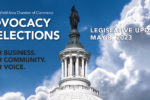Legislative Update: April 5, 2021
Here’s latest update from our Oregon State Chamber of Commerce (OSCC) legislative counsel, outlining what’s happening (OSCC Political Observations), activity on major issues, and what’s coming up. Any opinions expressed or implied are those of OSCC and do not necessarily reflect those of the Springfield Chamber or its representatives.
What’s Happening (OSCC Political Observations)
With the April 13th deadline for bills to advance out of policy committees in their chamber of origin, committee schedules are utterly packed with scheduled work sessions and bills are either living, dying or being amended by the hour.

We are starting to witness a number of “sneaker amendments” being introduced stealthily at the 11th hour with no foreknowledge or public participation. These amendments will ultimately be rammed through. But yes, this is the most “transparent legislature in history.”
Committee agendas are packed. In many cases, OSCC is monitoring three committees and corresponding with committee members at the same time.
To add the workload, lawmakers are expected to begin deliberations over traditional state budget bills as well as how to allocate $780 million worth of federal aid associated with the American Rescue Plan Act (ARPA) over the coming week. Though lawmakers in the House did agree to a narrow compromise that will allow for waiver of the requirement that bills be read in full during consideration of budget bills, the continued backlog of policy bills as well as pressures from the first chamber deadline in the Senate and House will likely result in the Legislature continuing to work very long hours in the weeks ahead.
We continue to believe there will be little appetite to open the Capitol building to the public for the entirety of the 2021 session.
Budget. This week, the budget writers will begin their review of projects that have been submitted for ARPA funding. Over the past 10 days, legislators have been collecting and submitting capital funding requests that would be eligible for $780 million in one-time federal funding. These projects would be in addition to the normal funding projects eligible for capital funding from the state.
Taxes. We believe the “air is out of the balloon” on tax issues right now due to the large infusion of cash the state will receive from the Federal government as part of the $2.6 billion ARPA allocation to Oregon. The bills to disconnect businesses from Federal CARES Act tax benefits (SB 137, HB 2839) as well as bills to tax PPP loans (HB 2253) have lost steam.
However, we continue to be on guard with SB 139 which would eliminate Oregon’s lower tax rates for pass-through businesses. The reason we still believe this bill is viable is because although the legislature no longer needs the revenue, a critical mass of Democrat legislators in both the House and Senate oppose these lower rates on principle.
Bills OSCC is Concerned About
100% Clean Electricity Mandate (HB 2021) There continues to be a significant amount of behind-the-scenes discussions between environmental groups, investor-owned utilities and Democrat lawmakers regarding the development of this policy. As of this writing, no updated language has been released publicly. The bill is scheduled for public hearings and possible work sessions on three upcoming dates (including today) where we will most likely get our first look at the language that has been developed behind closed doors. As soon as updated language becomes available, we expect the debate surrounding HB 2021 to become one of the key flash points in this year’s session in much the same way that “Cap & Trade” was a flash point for 2019 and 2020.
Indirect Source Regulatory Program (HB 2814) Representative Maxine Dexter (D-Portland) shared with stakeholders last week that her bill to establish one of the most expansive indirect source regulatory programs in the country will be amended into a study bill examining the same issue. The DEQ-led study will specifically focus on diesel emissions, with the goal of preparing legislation for the 2023 legislative sessions. As with most study bills, HB 2814 will likely end up in the Joint Committee on Ways and Means for a review of its budget impacts. OSCC is part of the coalition in opposition to the bill will meet with other groups to reassess strategy for the rest of the legislative session.
Presumption of Retaliation (SB 483) SB 483 as amended creates a rebuttable presumption that an employer has engaged in retaliation or discrimination if – within 60 days of an employee or prospective employee reporting a labor or workplace safety violation – the employer takes an adverse employment action against that person. The presumption of retaliation is rebuttable upon by a demonstration of a preponderance of the evidence. The bill is set for a Senate floor vote as soon as this week.
Expansion of Oregon Family Leave Act (HB 2474) This bill would expand Oregon’s family leave law down to the smallest of employers (1 employee) and add new provisions. This bill is a work in progress that OSCC is monitoring.
Bills OSCC is Supporting
Repeal Oregon taxes on federal stimulus payments (SB 842). OSCC is testifying in support of this bill which would ensure all Oregon residents get the full amount of their Federal Economic Impact Payments without state taxation. You can see OSCC testimony here.
Tax Credit for Forgiven Rents (SB 330). OSCC continues to support this bill, which would give commercial landlords a tax credit, to be taken over 5 years, for forgiven rents. We believe this is an elegant way to keep landlords as whole as possible while helping struggling small businesses to be able to keep their business locations intact. You can see OSCC testimony here.
Unemployment Insurance Rate Reduction (HB 3389). OSCC testified for and strongly supports this bill, which would enact a number of policies that would help struggling small businesses to lower their unemployment insurance liability. Among other things, the bill would revert an employer’s experience rating back to 2019 levels and update Unemployment Trust Fund solvency requirements to lower tax rates into the future.
Discover more from Springfield Bottom Line
Subscribe to get the latest posts sent to your email.





